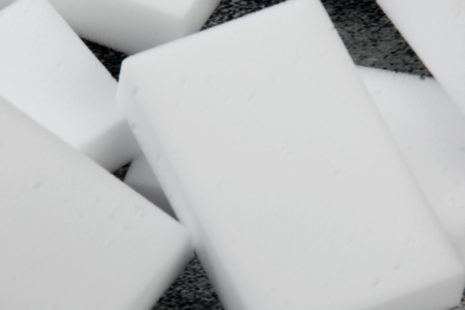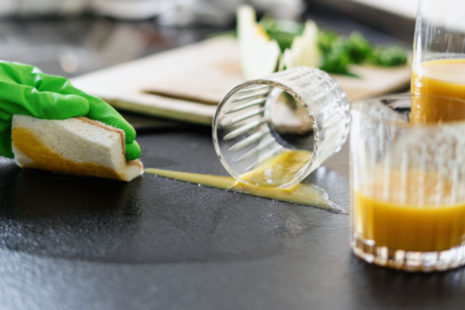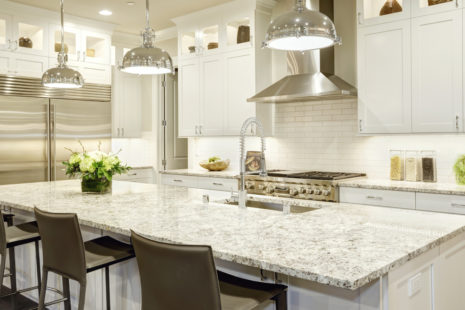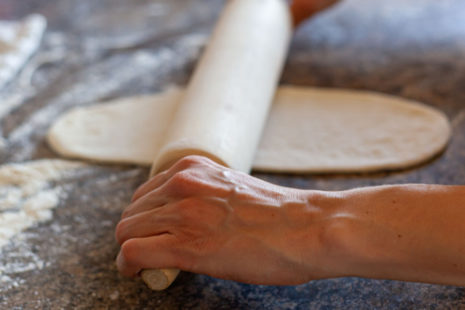The countertop decision—it’s one of the most significant choices you’ll make during your kitchen or bathroom renovation. Standing at the crossroads between granite and quartz? You’re not alone. These two premium materials dominate the high-end countertop market, each with passionate advocates and compelling advantages. Let’s cut through the confusion and help you determine which surface truly aligns with your lifestyle, aesthetic preferences, and practical needs.
Differences in Composition and Appearance
Before diving into performance comparisons, it’s essential to understand what these materials actually are—because the differences in their makeup directly influence everything from appearance to maintenance requirements.
Granite: Nature’s Masterpiece
Granite is 100% natural stone, formed over millions of years as molten rock cooled and solidified under intense pressure deep within the earth. Quarried directly from the earth in massive blocks and sliced into slabs, each piece of granite is absolutely unique—a one-of-a-kind geological specimen with patterns that will never be exactly replicated.
The distinctive characteristics of granite include:
- Random, organic patterning with mineral deposits creating unique specks, veins, and movement
- Depth and dimension with crystalline structures that catch light differently depending on viewing angle
- Wide color spectrum including whites, blacks, browns, beiges, blues, reds, greens, and even rare purple varieties
- Visible natural variation even within a single slab, telling the story of its formation
When you choose granite, you’re selecting a specific piece of the earth’s crust with its own geological history and character. This natural uniqueness means you should always select your exact slab in person rather than choosing from small samples.
Quartz: Engineered Excellence
Quartz countertops, by contrast, are engineered stone products composed of approximately 90-95% ground natural quartz crystals combined with polymer resins and pigments. This engineered approach delivers consistency and predictability that nature simply cannot match.
The key visual attributes of quartz include:
- Consistent patterning with precisely controlled distribution of colors and particles
- Uniform appearance from slab to slab within the same product line
- Designer-selected color palettes including options that mimic natural stone as well as solid colors impossible in nature
- Even distribution of features without the unpredictable variations found in natural stone
Modern manufacturing techniques have dramatically improved quartz’s aesthetic range, with premium lines now offering remarkable simulations of marble, granite, and other natural stones—sometimes so convincing that even industry professionals must look closely to distinguish them.
Durability and Maintenance Comparison
When investing in premium countertops, longevity and ease of care are paramount concerns. Here’s how these materials compare in daily life:
Scratch Resistance
Granite: Extremely hard (registering 6-7 on the Mohs hardness scale), granite resists scratching from most kitchen utensils and everyday items. However, it’s not impervious—diamond, the only natural material harder than quartz, will scratch it, as can some ceramic knives and abrasive cleaners.
Quartz: Engineered to maximize the natural hardness of quartz minerals (7 on Mohs scale), these countertops offer superior scratch resistance for typical kitchen activities. The resin binders actually provide some elasticity that can make quartz slightly more forgiving than granite under certain impacts.
Winner: Quartz, by a narrow margin, particularly in busy kitchens where protection from daily wear is essential.
Heat Resistance
Granite: Formed under extreme temperatures, granite exhibits exceptional heat resistance. Hot pots and pans placed directly on the surface typically won’t cause damage, though sudden extreme temperature changes (thermal shock) could potentially cause issues with seams or existing fissures.
Quartz: The resin components in quartz countertops make them somewhat vulnerable to heat damage. Prolonged exposure to temperatures above 150°F can potentially discolor or damage the surface. Trivets and hot pads are absolutely necessary.
Winner: Granite, with its superior ability to handle high temperatures without damage.
Stain Resistance
Granite: As a natural stone with varying degrees of porosity, granite requires regular sealing (typically annually) to maintain its stain resistance. Properly sealed granite repels most stains effectively, but neglecting maintenance can leave it vulnerable, particularly to oils and dark liquids.
Quartz: The non-porous nature of quartz—thanks to those resin binders—makes it inherently stain-resistant without any sealing required. Spills that would permanently mark unsealed granite simply wipe away from quartz, even after extended contact.
Winner: Quartz, offering superior stain resistance with zero maintenance requirements.
Chip and Crack Resistance
Granite: Though exceptionally hard, granite can chip if heavy objects are dropped on edges or corners. Natural fissures in the stone may occasionally become more pronounced over time, though this rarely affects structural integrity.
Quartz: The resin content in quartz provides flexibility that helps resist chipping better than purely brittle materials. However, excessive force can still cause damage, particularly at edges and seams.
Winner: Quartz, with its engineered resilience providing slightly better protection against everyday impacts.
Overall Maintenance Requirements
Granite:
- Requires sealing every 6-12 months depending on use and specific variety
- Benefits from specialized stone cleaners (avoid acidic or abrasive options)
- May need occasional professional attention for stubborn stains or minor repairs
- Shows fingerprints on darker varieties
Quartz:
- Never needs sealing
- Cleans easily with soap and water or mild cleaners
- Rarely requires professional maintenance
- Resists fingerprints better, especially in textured finishes
Winner: Quartz, with significantly lower maintenance demands over its lifetime.
Cost Analysis of Granite and Quartz
Investment considerations extend beyond the initial price tag to include long-term value, something savvy homeowners understand when weighing these premium options:
Initial Installation Costs
Granite typically ranges from $40-$100+ per square foot installed, with pricing influenced by:
- Rarity and origin of the specific stone
- Thickness (typically 3cm for kitchen applications)
- Edge profile complexity
- Number of cutouts required
- Local market conditions
Entry-level granite options have become more affordable over the years, sometimes starting as low as $35 per square foot for basic colors and patterns with simple edge treatments.
Quartz generally costs $55-$120+ per square foot installed, with variables including:
- Brand prestige (Caesarstone, Silestone, Cambria command premium prices)
- Design complexity
- Edge profile selection
- Project complexity
- Regional labor rates
The most sought-after designer quartz lines may exceed $150 per square foot for intricate patterns mimicking exotic natural stones.
Cost Winner: Granite, particularly at entry-level price points, though premium varieties of both materials have comparable costs.
Long-Term Value Considerations
Beyond initial costs, consider these long-term financial factors:
Granite:
- Sealing supplies cost approximately $30-$50 annually for DIY maintenance
- Professional sealing services range from $170-$300 for typical kitchens
- Repairs for chips or cracks typically cost $200-$500 depending on severity
- May require replacement sooner in high-use environments if maintenance is neglected
Quartz:
- Zero ongoing maintenance costs for sealing
- Lower likelihood of requiring repairs
- Typically offers longer warranties (many manufacturers provide 15-25 year coverage)
- More consistent performance in commercial or heavy-use settings
Long-Term Value Winner: While specific circumstances vary, quartz often provides better lifetime value despite higher initial costs, particularly for busy households valuing low maintenance.
Which Material Suits Your Lifestyle?
The “better” material ultimately depends on your specific circumstances, preferences, and priorities. Consider these lifestyle factors when making your decision:
Choose Granite If You:
- Value one-of-a-kind natural materials with character and history
- Appreciate the slight variations and “movement” in natural stone
- Are willing to perform simple annual maintenance
- Frequently work with hot cookware directly on surfaces
- Want slightly lower initial investment for premium countertops
- Prefer a material with established resale value history
Choose Quartz If You:
- Prioritize consistency and predictability in appearance
- Want the absolute lowest maintenance requirements
- Have young children who may leave spills unattended
- Prepare acidic foods regularly (citrus, vinegar, wine)
- Prefer modern, designer-curated aesthetics
- Value maximum stain resistance without ongoing treatments
- Want the peace of mind of longer warranty coverage
Making Your Final Decision
When deciding between these exceptional materials, consider visiting stone yards to view full slabs rather than small samples—particularly for granite, where variation within a single slab can be significant. Ask for samples to take home and test with common kitchen items and cleaning products.
Remember that either choice represents a significant upgrade from laminate, tile, or solid surface options, with both granite and quartz offering decades of beautiful service when properly selected and installed.
The countertop you choose will influence your daily experience in your most-used spaces, so take time to consider not just how it looks on installation day, but how it will perform through years of holiday gatherings, weekday breakfast rushes, and everything in between.
Whether you select the natural uniqueness of granite or the engineered perfection of quartz, investing in premium countertops consistently ranks among the home improvements with the highest satisfaction ratings and return on investment.




